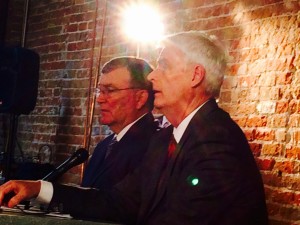Literacy isn’t just a loose end in the 2016-17 K-12 budget.
It should be Idaho’s top education priority, House Speaker Scott Bedke told reporters Tuesday.

“There is no excuse for graduating third graders who are not reading at grade level,” Bedke, R-Oakley, said during a luncheon meeting sponsored by the Idaho Press Club.
After some fits and starts, the House passed two bills last week that tie into Gov. Butch Otter’s $10.7 million literacy initiative — aimed at helping kindergartners through third-graders who are reading below grade level. But these bills have no money attached to them. And because the literacy bills haven’t passed the Senate yet, the Joint Finance-Appropriations Committee did not fund literacy programs in the K-12 budget unveiled Monday.
Legislative leaders expect the literacy bills to pass the Senate, and JFAC is expected to fund the literacy program in a “trailer” spending bill later in the session.
On Tuesday, Bedke made an impassioned case for literacy.
Early literacy programs should be the first place Idaho puts education money, he said. It should come before programs to boost college scholarships or freeze college tuition. And while subpar reading scores can be blamed on parenting or an outdated assessment — “insert your excuse here,” said Bedke — failure is unacceptable.
“We should all be about the business of fixing that,” he said.
Bedke and Senate President Pro Tem Brent Hill, R-Rexburg, fielded a wide variety of questions Tuesday — offering a late-session update on education funding, taxes and other topics.
A few highlights:
The K-12 bottom line. The K-12 budget will be the 2016 Legislature’s greatest accomplishment, Hill said.
The budget is a work in progress, Bedke said, but it should at least match the 7.4 percent funding increase approved a year ago.
JFAC’s K-12 budget funds a 6.8 percent increase for K-12 — less than the 7.9 percent increase proposed by Gov. Butch Otter, and the 7.6 percent increase sought by state superintendent Sherri Ybarra.
Trailer bills, such as the literacy budget, would bolster the 6.8 percent increase proposed Monday.
Student mobility money. The Legislature will probably look for a short-term stopgap to address a thorny issue: providing money for schools that take on new students during the academic year.
Otter vetoed a mobility bill in 2015 — but earmarked about $2.5 million in his 2016-17 budget to address the issue. A new student mobility bill hasn’t even surfaced yet, and legislative leaders hope to adjourn the 2016 session this month.
The Legislature will probably look for a one- or two-year fix, Bedke said. If that happens, JFAC would follow up with another trailer spending bill.
Legislative leaders are looking for a short-term fix, since a legislative interim committee is expected to spend the next year or more studying Idaho’s complex and outdated school funding formula. The formula was last rewritten in 1994.
Tax cuts. Hill suggested the Senate may still pass tax relief that’s similar to the $27.8 million tax cut the House passed a month ago.
Last week, Senate Local Government and Taxation Committee Chairman Jeff Siddoway, R-Terreton, told Jake Melder of KIVI TV he won’t consider a tax cut unless schools are properly funded. Hill doesn’t expect Siddoway to stand in the path of a tax cut — but Hill also said the Senate GOP caucus hasn’t really talked about tax bills yet.
Presidential politics. As voters in 11 states head to the polls for Super Tuesday, both Bedke and Hill said they would support GOP frontrunner Donald Trump is he secures the party’s nomination.
“Considering the alternatives, that’s an easy choice for me,” said Hill.
